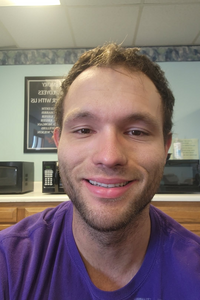Grant Hill
Grant Hill (Republican Party) is running for election to the U.S. House to represent Iowa's 1st Congressional District. He declared candidacy for the Republican primary scheduled on June 2, 2026.[source]
Hill is also running for election to the Iowa House of Representatives to represent District 88. He declared candidacy for the Republican primary scheduled on June 2, 2026.[source]
Hill completed Ballotpedia's Candidate Connection survey in 2025. Click here to read the survey answers.
Biography
Grant Hill earned a high school diploma from Keota High School and an associate degree from Indian Hills Community College in 2017. His career experience includes working in business. As of 2025, Hill was affiliated with 1 Love Legacy.[1]
Elections
2026
U.S. House
See also: Iowa's 1st Congressional District election, 2026
General election
The primary will occur on June 2, 2026. The general election will occur on November 3, 2026. General election candidates will be added here following the primary.
Democratic primary election
Democratic primary for U.S. House Iowa District 1
Christina Bohannan and Travis Terrell are running in the Democratic primary for U.S. House Iowa District 1 on June 2, 2026.
Candidate | ||
 | Christina Bohannan | |
Travis Terrell  | ||
 = candidate completed the Ballotpedia Candidate Connection survey. = candidate completed the Ballotpedia Candidate Connection survey. | ||||
| If you are a candidate and would like to tell readers and voters more about why they should vote for you, complete the Ballotpedia Candidate Connection Survey. | ||||
Do you want a spreadsheet of this type of data? Contact our sales team. | ||||
Withdrawn or disqualified candidates
- Taylor Wettach (D)
- Bob Krause (D)
Republican primary election
Republican primary for U.S. House Iowa District 1
Incumbent Mariannette Miller-Meeks, Grant Hill, and David Pautsch are running in the Republican primary for U.S. House Iowa District 1 on June 2, 2026.
 = candidate completed the Ballotpedia Candidate Connection survey. = candidate completed the Ballotpedia Candidate Connection survey. | ||||
| If you are a candidate and would like to tell readers and voters more about why they should vote for you, complete the Ballotpedia Candidate Connection Survey. | ||||
Do you want a spreadsheet of this type of data? Contact our sales team. | ||||
Endorsements
Ballotpedia is gathering information about candidate endorsements. To send us an endorsement, click here.
Iowa House of Representatives
See also: Iowa House of Representatives elections, 2026
General election
The primary will occur on June 2, 2026. The general election will occur on November 3, 2026. General election candidates will be added here following the primary.
Republican primary election
Republican primary for Iowa House of Representatives District 88
Grant Hill is running in the Republican primary for Iowa House of Representatives District 88 on June 2, 2026.
Candidate | ||
 | Grant Hill  | |
 = candidate completed the Ballotpedia Candidate Connection survey. = candidate completed the Ballotpedia Candidate Connection survey. | ||||
| If you are a candidate and would like to tell readers and voters more about why they should vote for you, complete the Ballotpedia Candidate Connection Survey. | ||||
Do you want a spreadsheet of this type of data? Contact our sales team. | ||||
Endorsements
Ballotpedia is gathering information about candidate endorsements. To send us an endorsement, click here.
Campaign themes
2026
U.S. House
Ballotpedia survey responses
See also: Ballotpedia's Candidate Connection
Grant Hill has not yet completed Ballotpedia's 2026 Candidate Connection survey. If you are Grant Hill, click here to fill out Ballotpedia's 2026 Candidate Connection survey.
Who fills out Ballotpedia's Candidate Connection survey?
Any candidate running for elected office, at any level, can complete Ballotpedia's Candidate Survey. Completing the survey will update the candidate's Ballotpedia profile, letting voters know who they are and what they stand for. More than 25,000 candidates have taken Ballotpedia's candidate survey since we launched it in 2015. Learn more about the survey here.
Help improve Ballotpedia - send us candidate contact info.
Iowa House of Representatives
Ballotpedia survey responses
See also: Ballotpedia's Candidate Connection
Grant Hill completed Ballotpedia's Candidate Connection survey in 2025. The survey questions appear in bold and are followed by Hill's responses.
| Collapse all
I’ve managed restaurants, hotels, gas stations, and retail stores. I’ve worked in factories, landscaping, and nonprofits. I’ve earned close to six figures a year—and I’ve also lived on food stamps and Medicaid. I’ve seen every side of the system. I know what it’s like to live paycheck to paycheck, and I understand the struggles Iowa families face—because I’ve lived them all.
I’m not a polished politician. I’m a fighter with real-life experience who wants to bring accountability, transparency, and compassion to our state government. I won’t pretend to have all the answers, but I’ll show up in every town, listen to your concerns, and fight to make your voice heard at the Capitol. I believe our district deserves someone who’s not tied to party agendas but committed to serving the people. That’s what I offer.- Real Experience, Real Representation I've lived every side of life in Iowa—managing businesses, working blue-collar jobs, earning near six figures, to surviving on food stamps and Medicaid. I understand the struggles of District 88 because I’ve lived them. I'm not a career politician—I'm a working Iowan who will fight for everyday people.
- Redemption and Reform My journey includes incarceration, and I’m not hiding from it. I’ve seen firsthand how broken our justice and rehabilitation systems are. I believe in second chances and in policies that help people rebuild—not keep them trapped. I’ll work for smart, compassionate reforms that reflect both accountability and mercy.
- Your Voice, Not My Agenda Too many politicians focus on their own beliefs and careers. I’m committed to hearing YOUR voice. I will visit every town in our district, listen to your concerns, and take them to the Capitol. This campaign is about serving the people of District 88—not pushing a party line
2. Mental Health and Addiction Services – expanding access to treatment over incarceration, and investing in recovery programs that deal with root causes.
3. Economic Opportunity – raising wages, supporting small businesses, and creating new ways for people to earn and build wealth, including through local job creation and incentives like plasma donation centers.
4. Religious Liberty – especially within institutions like prisons, where hope and faith can be a lifeline.
An elected official should listen more than they speak, represent the people over their own agenda, and be willing to admit when they’re wrong. They should show up—in every town, every meeting, every tough conversation—and be transparent, accountable, and accessible.
I’m also transparent, unafraid to speak the truth, and deeply committed to serving others over self. I don’t pretend to have all the answers, but I do have the willingness to listen, learn, and lead with humility. I want to be a voice not just for the privileged—but for everyday Iowans who’ve been overlooked, counted out, or silenced.
Representatives are also expected to hold state agencies accountable, manage budgets responsibly, and fight for transparency in government. Ultimately, their duty is to be a voice for the people, not a puppet for political agendas.
More than anything, I hope to leave behind a legacy of hope, accountability, and compassion. I want to inspire others—especially the forgotten, the formerly incarcerated, and the struggling—to believe they still have a purpose. I want to change how we see justice, how we treat one another, and how we lead with love and truth.
It taught me that ownership matters, and that ordinary people can build extraordinary legacies with the right mindset and work ethic.
But I refused to stay down. I’ve worked every day to become better—not just for myself, but to be a voice for those who don’t get second chances. Turning that pain into purpose has been the hardest and most rewarding journey of my life.
The governor should set a vision, but the legislature should represent the voice of the people in shaping how that vision is carried out. Lawmakers shouldn’t be rubber stamps, nor should they play political games just to score points. We’re elected to work together, not against each other.
1. Workforce Retention and Development – Young people are leaving our state in search of better opportunities. We need to invest in skilled trades, technology training, and job creation to keep Iowa competitive and livable for the next generation.
2. Mental Health and Addiction – Our healthcare systems are overwhelmed, especially in rural areas. Without serious investment in mental health care and addiction recovery services, we’ll keep treating symptoms instead of healing root causes.
3. Corrections and Criminal Justice Reform – Our prisons are overcrowded and under-resourced. We must focus on rehabilitation, not just punishment—especially for nonviolent offenders—and hold our own Department of Corrections accountable.
4. Agricultural Resilience – As climate change and global markets evolve, we need to ensure our farmers have the tools, support, and freedom to thrive—while preserving Iowa’s land and water for future generations.
The Bible says in 1 Corinthians 12, “The body is not made up of one part but of many.” Just like in the Church, government works best when every part—every perspective, every background—has a role. We need both the experienced and the outsiders to build something strong and representative.
Good policy doesn’t come from isolation—it comes from conversation, from finding common ground, and sometimes from learning something new by listening to someone else’s perspective. I believe in respectful debate, open minds, and servant leadership.
I’m not running to follow in anyone’s footsteps. I’m running to show what redemption looks like, to give hope to those who’ve been counted out, and to remind Iowa that your past doesn’t disqualify you—your character and commitment define you.
Real change doesn’t happen overnight—but I’m in this for the long haul, and I’m just getting started
Everyone has a story worth hearing, and I’m committed to making sure those voices—not just politicians’ voices—are what guide my work in office.
The legislature represents the people, and emergency powers must be transparent, limited in scope, and time-bound, with regular oversight to ensure they aren’t abused or extended beyond necessity. Balance between the executive and legislative branches is crucial to maintaining trust and protecting constitutional rights—even during uncertain times.
For too long, correctional officers have been allowed to operate with little oversight, and in some cases, have even contributed to the flow of drugs inside our prisons. I was personally told by IDOC leadership that some officers hadn’t been tested since they were hired—despite years of complaints and red flags. That’s unacceptable.
Public Safety Committee – to promote transparency in law enforcement and corrections, ensuring safety and accountability in our communities.
Health and Human Services Committee – to expand access to mental health care, addiction treatment, and vital services for low-income and working families.
Economic Growth or Commerce Committee – to champion small businesses, drive local job creation, and support innovative approaches to rural development.
I support open budgets, regular public reporting, and legislation like my proposed Open Office Act, which would require representatives to maintain regular in-district office hours and make all non-confidential communications available for public review. Too many politicians disappear after getting elected—I believe in showing up, staying accessible, and being held accountable.
That said, it must be transparent, fact-based, and protected from special interest manipulation. We need to make sure it uplifts the voices of everyday Iowans—not just those with money and influence.
Note: Ballotpedia reserves the right to edit Candidate Connection survey responses. Any edits made by Ballotpedia will be clearly marked with [brackets] for the public. If the candidate disagrees with an edit, he or she may request the full removal of the survey response from Ballotpedia.org. Ballotpedia does not edit or correct typographical errors unless the candidate's campaign requests it.
Campaign finance summary

See also
2026 Elections
External links
Footnotes
- ↑ Information submitted to Ballotpedia through the Candidate Connection survey on May 13, 2025










